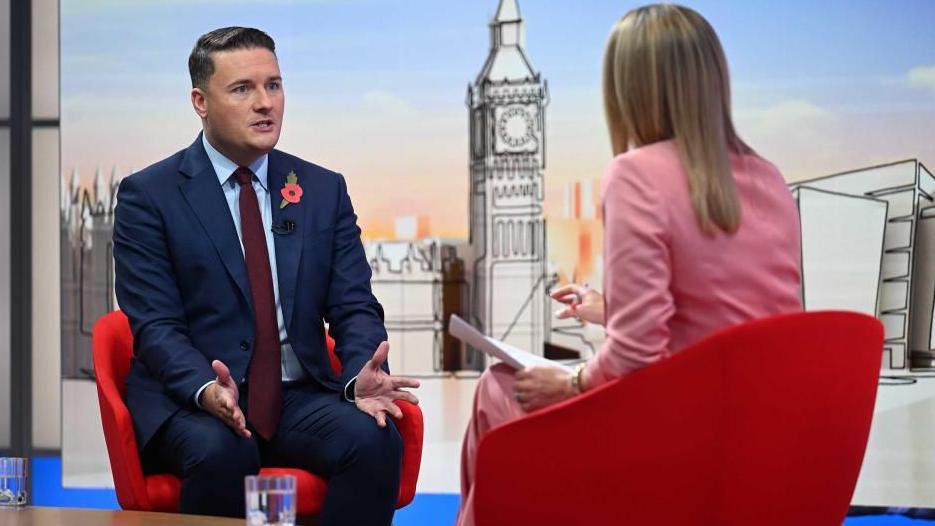We will not 'be held to ransom' by striking doctors, says minister

- Published
The government will not "be held to ransom" by striking doctors, Health Secretary Wes Streeting has said.
A five-day walkout by resident doctors is due to take place between 14-19 November, in a long-running dispute over pay.
Streeting told the BBC there was a deal available to increase the number of speciality training places and provide support for things like exam fees.
But he said: "I can't do that if I'm spending a quarter-of-a-billion pounds meeting the costs of strikes."
The British Medical Association (BMA) said Streeting could prevent strikes "by bringing credible proposals to the table and not play[ing] politics with doctors who dedicate their lives to the health of the nation."
In an interview on Sunday with Laura Kuenssberg, Streeting said the strike action had "little to no public support", and would be "inflicting more harm and delays to patients".
He added that the deal, which does not include negotiating on pay rises, remained on the table.
But he told the programme: "What we will not do, however, is be held to ransom and what I will not do is allow those costs of strikes to be inflicted on other NHS staff who are working constructively with us, or on patients in terms of the services that they receive."
The strike - the 13th in the pay dispute since March 2023 - is expected to cause significant disruption, including in hospitals.
The BMA and the government have been in dialogue throughout the summer and early autumn since the last walkout at the end of July, but talks broke down earlier this month.
Streeting has maintained he would not negotiate on pay after resident doctors, the new name to junior doctors, received pay rises totalling nearly 30% in the past three years.
Talks had instead focused on career progression, working conditions and out-of-pocket expenses like exam fees.
But the union argues that resident doctors' pay is still a fifth lower than it was in 2008, once inflation is taken into account.
Resident doctors announce five-day strike in November
- Published23 October
First-year resident doctors back strike action over jobs shortage
- Published6 October
They have also said they wanted the government to address what they say is a shortage of jobs after the second year of training when resident doctors move into speciality training.
This year there were more than 30,000 applicants for 10,000 jobs at this stage, although some will have been doctors from abroad.
Streeting said the current government offer, which would provide additional training places and help with out-of-pocket expenses, would "be a win-win scenario where together we motor ahead with the progress we're making in the NHS".
But the BMA said the government had not presented "any proposals to us which will see the real change needed to fix the jobs crisis this year".
It added that it had requested "as little as £1 per hour more over the next few years" in terms of a pay deal for resident doctors.
"Mr Streeting should be honest with patients: we are losing doctors to other countries and professions because they can't find work in the UK - despite training here and wanting to work here," the statement added.
Streeting also partly blamed previous industrial action for an increase in NHS waiting lists.
Latest figures show about 6.26 million patients were waiting for treatments to be carried out at the end of August, up from 6.25 million patients at the end of July.
"We had industrial action by resident doctors, that had an impact and set us back, as I feared it would and said it would at the time," Streeting told the programme.
"We've also seen demand outstripping growth in activity."
He added that he believed the NHS would "begin to see improvement again on waiting lists in the coming months."
Get in touch
Will you be affected by the doctors' strikes in November? Have you had a long wait for treatment? Are you a resident doctor who will be going on strike? Get in touch.